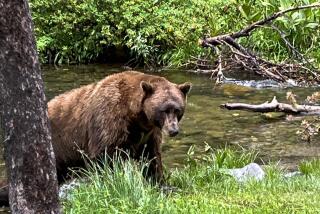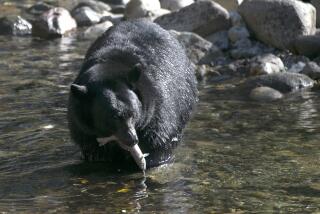Colorado woman who fed bears is killed by one
- Share via
DENVER — Donna Munson, 74, considered the black bears that swarmed across her land in southwestern Colorado to be her pets.
She fed them dog food and scraps -- poking the food through a metal fence she built around her porch -- attracting so many bears that neighbors sometimes counted as many as 14 on her property at a time.
On Friday, one of them killed and ate Munson, slashing her head through the fence and dragging her body underneath it.
“She was dead set on continuing to feed the bears, and unfortunately, she paid the ultimate price,” said Ouray County Sheriff’s Investigator Joel Burk, who had to shoot a bear that tried to approach Munson’s remains as he interviewed witnesses.
If Munson’s death is the worst consequence that can result when people get too familiar with wild animals, her actions were extreme, Tyler Baskfield, spokesman for the Colorado Division of Wildlife, said Tuesday.
Her death is one of the rare instances in which bears have killed people in Colorado; officials have recorded two other fatal attacks since they began keeping track in the 1960s.
For the last decade, Munson had developed a reputation for doting on wildlife at her log cabin in Ouray County, about 190 miles southwest of Denver. She fed bears, skunks, elk and stray cats, said Tammy York, 36, who boarded with Munson seven years ago.
She described Munson as a sweet woman whose husband had died years ago and who seemed to have little contact with people. “I think she really loved them and loved to watch them,” York said.
And Munson and others were watched in return. “It was like being in a zoo. We looked at the animals, but they also looked in our windows,” she said.
When bears began breaking into nearby homes -- apparently seeking the dog food they were accustomed to getting from Munson -- neighbors complained. Wildlife officers tried to persuade her to stop, Baskfield said.
It didn’t work, and last year the state sent her a letter warning that it would pursue legal action if Munson didn’t stop.
When she continued, officers began working on building a case against her, Baskfield said.
But state law requires proof that a person is knowingly feeding wildlife, and Baskfield said officers didn’t have the evidence they needed to issue a citation. He said he doubted a $100 fine would have stopped Munson.
“To friends and family she trusted, she would tell them, yes, she was feeding the bears, but they were harmless, they were her friends. She was helping them and they would help her,” Burk said. “When people told her she was in danger, she would refute that, saying, ‘These are my pets, my babies.’ ”
On Thursday, the night before her death, Munson made reference to one of those “babies” as she spoke on the phone with a relative. “Oh, the little bear is here. I need to go and take care of the little bear,” Burk said Munson told a family member.
The next day, a man arrived at her home to ask about a painting job and spotted her body, Burk said.
Munson apparently was standing inside her porch when a bear swiped at her face through the fence, Burk said. An autopsy released this week indicated that she was unconscious when the bear pulled her underneath the fence into the yard. Her walker was found inside the fence, Burk said.
“It was one of the more gruesome scenes I’ve dealt with,” he said.
Burk was interviewing witnesses at the scene when a 250-pound bear approached, ignoring deputies as it tried to reach Munson’s remains. “It had no fear,” said Burk, who ushered witnesses into his car, retrieved a shotgun and shot the animal.
A 400-pound bear was shot the next morning as it nosed around the scene. An autopsy revealed human flesh and Munson’s shirt in its stomach.
In the nearby community of Ouray, some are upset with Munson for endangering them, said Christine Kersen, owner of Apteka, a liquor store on the town’s main street.
Feeding the bears was foolish, she said. “They’re wild animals. They’re not pets.”
More to Read
Sign up for Essential California
The most important California stories and recommendations in your inbox every morning.
You may occasionally receive promotional content from the Los Angeles Times.













